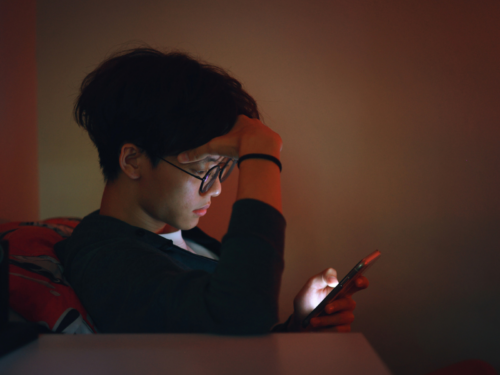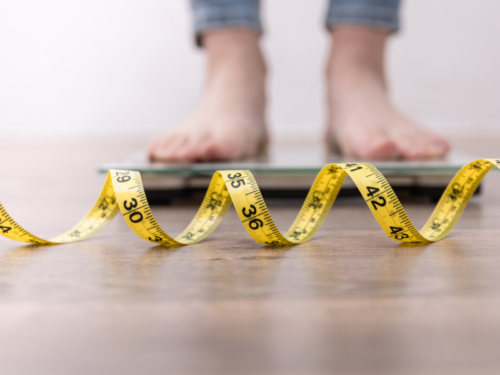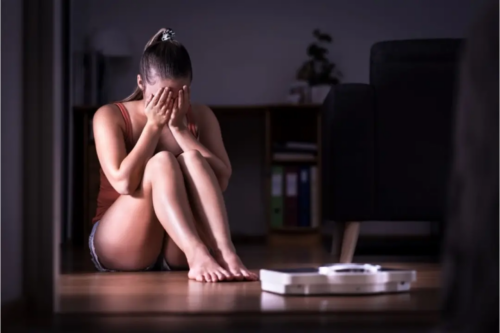
Table of Contents
Understanding Social Media’s Impact on Eating Disorders
Written By: Charlie Health Editorial Team

Clinically Reviewed By: Dr. Don Gasparini
Updated: March 27, 2024
5 min.
A registered dietician explains the link between social media and eating disorders.
Learn more about our Clinical Review Process
Table of Contents
The impacts of social media on youth mental health are the subject of much debate. At best, social media platforms can be a tool for connection; at worst, they can take a toll on mental health — including promoting body dissatisfaction.
“Content shared on various social media channels can be a breeding ground for [body] comparison and judgment,” says Ellie Stamerjohn, MS, RDN, LD, Registered Dietitian at Nourish. “Trends including ‘what I eat in a day,’ the discussion and promotion of weight loss medications, restrictive fad diets, and unrealistic beauty standards shown by influencers and celebrities tend to be the most problematic for those struggling with their relationship with food and their body,” she adds.
Below, we delve into data on how social media platforms affect those with eating disorders, disordered eating, or body image concerns and debunk myths about eating disorder diagnosis and treatment.
Join the Charlie Health Library
Get mental health updates, research, insights, and resources directly to your inbox.
You can unsubscribe anytime.
Social media and eating disorders: a look at the data
There's no denying the link between eating disorders and social media usage, particularly in the development of negative body image. Time and time again, studies have shown that social media sites worsen many adolescents’ body image.
Stamerjohn specifically points to research from 2016 showing a consistent connection between prolonged social media usage and eating concerns among young adults. Another study from that year demonstrates a strong link between social media use and body image issues, including promoting starvation-style diets, encouraging extreme exercise, and fostering low self-esteem.
These findings are not a coincidence: internal research from Meta shows that Instagram worsens body image for one in three teenage girls (a finding that company executives disregarded for years). “Meta has recently made changes to regulate potentially triggering ED-related content fed to teens, but unfortunately, their efforts have not completely put the issue to rest,” says Stamerjohn. In fact, shortly after those changes were made earlier this year, social media executives called to testify before the Senate Judiciary Committee about child exploitation and social media.

Every Adult Should Know How Social Media Impacts Youth Mental Health
Dr. Caroline Fenkel, DSW, LCSW
The effects of social media and body image can be most triggering for those already living with an eating disorder. “Social media has the potential to make a significant impact on those who are struggling with an eating disorder,” says Stamerjohn, noting that people already living with an eating disorder may be particularly susceptible to the influence and pressures of body-related social media content.
However, it’s important to note that disordered eating behaviors and diagnosable eating disorders develop from a complex combination of genetic, environmental, and individual factors. While social media certainly plays a role in these conditions, there's no universally agreed upon or exact cause of eating disorders.
Breaking down common eating disorder myths
Here, we debunk four common myths about eating disorders, including who the conditions affect and how they are treated.
Myth: eating disorders primarily affect young white women
Myth: people with an eating disorder are thin
Myth: having an eating disorder means you have anorexia
Myth: eating disorders aren’t treatable
Fact: eating disorders can affect people of all ages, genders, and races
Fact: people with any body type can struggle with eating disorders
Fact: not everyone with an eating disorder has anorexia, and it’s not even the most common eating disorder
Fact: eating disorders can be treated with holistic support
Myth: eating disorders primarily affect young white women
The stereotype of someone with an eating disorder is that of a young white woman who’s very thin (more on that below). But that's not the case. In reality, anyone can be affected by an eating disorder regardless of age, gender, or race.
Unfortunately, stereotypes linked to eating disorders often deter people from seeking professional mental healthcare. Although BIPOC people are affected by eating disorders at similar rates overall as their white peers, they are about half as likely to be diagnosed, and their symptoms are less likely to be recognized by providers, data shows.
Myth: people with an eating disorder are thin
While weight loss or low body weight can sometimes be a characteristic of certain eating disorders, people with any body type can struggle with disordered eating or an eating disorder.
According to data compiled by the National Association of Anorexia Nervosa and Associated Disorders (ANAD), the vast majority of people with eating disorders are not underweight (only 6% of people with eating disorders are medically diagnosed as underweight). In fact, those with larger bodies face the greatest risk of developing an eating disorder, and within this group, a higher body mass index (BMI) correlates with a higher risk, ANAD shows.
Myth: having an eating disorder means you have anorexia
Not everyone with an eating disorder has anorexia—and anorexia nervosa is not the most common eating disorder. In fact, the most common eating disorder is OSFED (other specified eating disorder). As its name suggests, there isn't a clear match with any of the other eating disorders, but it's just as serious an illness. Other common eating disorders include:
- Bulimia nervosa: binge eating followed by behaviors to prevent weight gain (vomiting, excessive exercise, etc)
- Binge-eating disorder: consuming large amounts of food in a short period, accompanied by a sense of loss of control and feelings of distress or guilt
- Orthorexia: an unhealthy obsession with eating only "pure" or "clean" foods
Also, many people who don’t have a diagnosed eating disorder still struggle with disordered eating, an umbrella term used to describe feelings of discomfort around food, bodies, exercise, or other food-related issues. While disordered eating isn't always specific enough to merit an eating disorder diagnosis, it often shares the same triggers, patterns, and anxieties and can be just as serious regardless of diagnosis. When left unchecked, disordered eating can lead to serious physical health issues, and it can even pave the way to a diagnosable eating disorder.
Myth: eating disorders aren’t treatable
While eating disorders are complex mental health conditions, they can still be treated with holistic support. Eating disorder treatment often requires support from a multidisciplinary team that may include therapists, nutritionists, medical doctors, and other healthcare professionals. This comprehensive approach to eating disorder treatment helps people address underlying psychological issues, develop healthy coping mechanisms, and establish sustainable eating habits.

Mental health support at Charlie Health
Charlie Health is proud to offer mental health support for young adults struggling with both a mental health condition and an eating disorder. Our goal is to effectively care for all clients, and, as such, we cannot accept clients whose primary diagnosis is an eating disorder.
If you or a young person in your life are struggling with an eating disorder and co-occurring mental health condition, Charlie Health may be able to help. Our virtual Intensive Outpatient Program (IOP) provides more than once-weekly mental health treatment for teens, adolescents, and families dealing with serious mental health conditions. Our expert clinicians incorporate evidence-based therapies into individual counseling, family therapy, and group sessions. With this kind of holistic treatment, managing your mental health is possible. Fill out the form below or give us a call to start healing today.
References
https://pubmed.ncbi.nlm.nih.gov/28680630/
https://anad.org/eating-disorder-statistic/
https://www.sciencedirect.com/science/article/abs/pii/S1471015318300928?via%3Dihub
https://www.ncbi.nlm.nih.gov/pmc/articles/PMC5003636/
https://www2.psy.unsw.edu.au/Users/lvartanian/Publications/Fardouly%20&%20Vartanian%20(2016).pdf





